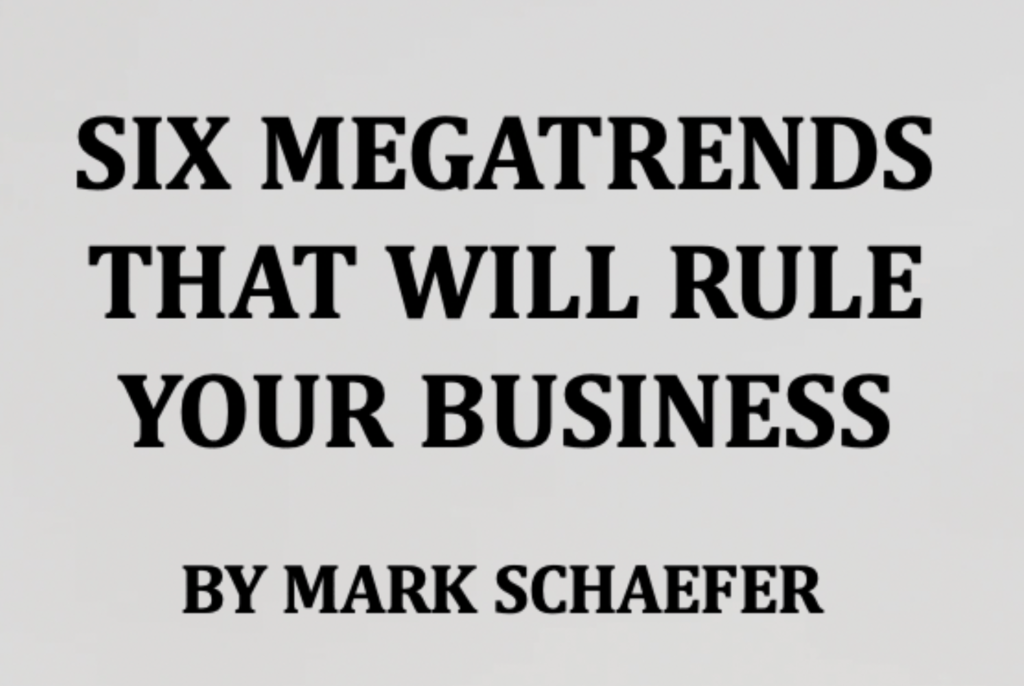
I dwell in the future. At least my brain does. So there is nothing I like more than thinking through the marketing megatrends coming next!
It’s become a sort of tradition on The Marketing Companion to spend a little time on marketing megatrends and Brooke Sellas and I cover some provocative ideas on the new show.
Here are a few of the big ideas we talk about in this unmissable episode!
Culture in, brand out
It used to be that companies would develop their brand positionings largely through introspection — by identifying what they saw as the defining attributes and benefits of their brand, then pushing that version on to the market. They operated as though they were in complete control.
Now, the idea of building brands in such an insular manner feels archaic. Today, brands need to look more actively and purposefully at the culture buzzing around them — in entertainment, in fashion, in news, on social media—and use that awareness to inform how they should best position and integrate themselves into the world at that moment.
This is a more powerful form of branding because by engaging with culture more directly, brands in effect can become a part of that culture, thereby deepening their relevance and connection with customers. And that has never been more prescient or necessary.
In the show, I discuss how this unusual trend is showing up at Pepsi and other places.
I’m not sure I have completely wrapped my head around this one. Listen to the show and let me know what you think.
CMO = CXO
Although Customer Experience is nothing new, making it the centerpiece of the marketing leadership role is. In 2020 and beyond, this will be the biggest driver of CMO success.
Marketers now have access to tools that can easily improve the overall customer experience. These tools should be used to help marketers focus on areas where they can undoubtedly improve customer experiences, like …
- Personalized support to customers
- Increasing customer engagement & loyalty
- Producing content that solves customers’ problems
The era of marketing navel-gazing
Marketers are under attack and, perhaps this is a response to the fact that we’ve entered a new era of fluffy self-importance where brand “meaning and purpose” define the role.
In this podcast episode, I provide an example of ridiculous marketing self-puffery.
Look, most people do NOT want a relationship with your brand. They just want to be left alone. So let’s get real and look at the marketing realities of our day.
An AI + Human Partnership
You’re probably expecting artificial intelligence to show up on a list of marketing megatrends, and with good reason. It’s time to move beyond AI as the “trend” and start thinking about the ways in which it can make us better, more data-driven marketers and business leaders.
Moving forward, focus on the areas where AI can help teams collaborate better. For us, that has meant delivering solutions to our clients in areas around …
- Product development
- Audience and trend analysis
- Content development
- Identifying influencers
AI, paired with super-smart humans, can both drive revenue and reduce costs. And since many tools already leverage some form of AI, the “trend” should be way past the technologies themselves and instead be focusing on business outcomes.
Nationalism: The most unusual of marketing megatrends!
Nationalism is not just a political trend. It might end up being among most important marketing megatrends of the next 10 years. Maybe on the surface, this doesn’t make sense. But consider:
- U.S. tech giants are being forced to pull out of India amid a wave of nationalism
- Russia is developing an independent internet that can be isolated from the rest of the world
- EU leaders in German and France are looking for ways to stem American influence via ubiquitous tech platforms
- Pakistan, India, and other countries routinely flick the internet on and off in the midst of crisis.
- Brexit will probably lead to more insular internet solutions in the UK
At one time, the internet held promise to be the great equalizer where any company could digitally connect with any market, but that is no longer the case.
Customer Care replaces customer service
If you’re not yet clear on what Customer Care is, think of it this way: Customer Service is reactive in that it serves one customer at a time and is triggered when the customer comes to the brand with a question or complaint. Customer Care is proactive; it uses human-centered AI to look for things like sentiment around branded keywords and topics and allows marketers to join the conversation for better Customer Care (even before a customer is a customer).
A true Customer Care strategy must also include immediacy. This means when a potential customer or customer reaches out with a question or complaint, they now expect an immediate answer (to every question, anytime, on any channel they choose).
To put it in perspective, a recent Google report underscored how “best” and “right now” mobile searches have grown by over 125%, while “where to buy” and “near me” mobile searches have grown by over 200%.
This is certainly an idea worthy of the marketing megatrends list!
Now I know this is hard to believe, but this post is only scratching the surface of what cover in the unusual marketing megatrends show!
You won’t want to miss this!
Click here to dive into Episode 178
Other ways to enjoy our podcast
- Try this! “Alexa, play the latest episode of The Marketing Companion.”
- Click here to download the latest episode or subscribe in iTunes
- Listen to us on iHeart Radio
- Find us on Google Play
- Find the podcast on Stitcher
- Complete Marketing Companion Episode Guide
- The Marketing Companion YouTube channel
Please support our extraordinary sponsors. Our content is free because of their generosity.
Many thanks to our friend Scott Monty for the awesome show intro. Be sure to check out his introspective newsletter Timeless & Timely, where he covers the latest trends and the oldest principles.
Tim Washer is contributing creative direction to the show and he’s has worked for Conan O’Brien, John Oliver, among others. He helps corporations build more creative cultures.
Nimble plugs into your email inbox and has a browser extension you can use on any website, including social media platforms and third-party apps. You’ll never have to leave the place you’re currently working on to access and update your existing contacts, as well as to create new contact records. Claim 30 percent off an annual license by going to nimble.com/companion and entering the promo code: COMPANION.
RSM employs dozens of specialists and experienced marketing directors who assist companies ranging from startups to market leaders with thousands of employees. Companies across the country from all categories are choosing this model to overcome marketing complexity and outpace their competition. The typical outsourcing client uses 11 RSM subject matter specialists but pays less than the cost of one of their own employees. RSM provides breakthrough marketing for clients and has been named twice to the INC 5000 list. Visit RSM for special Marketing Companion offers including $5,000 in free services.
Illustration courtesy Unsplash.com
